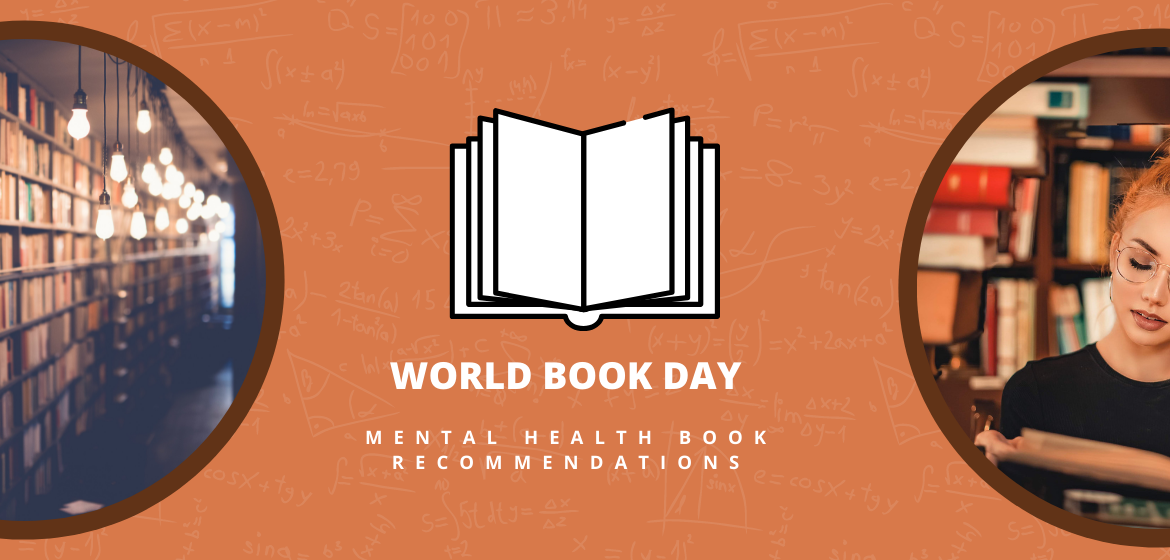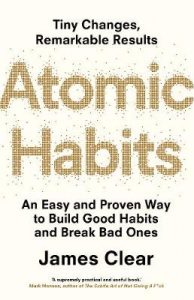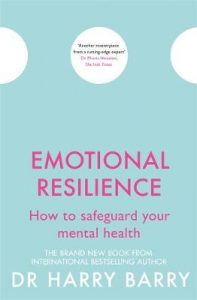
World Book Day Mental Health Book Recommendations
As part of World Book Day, we’ve asked some of the lecturers at ICHAS for their recommendations on books for mental health. Here are a couple of their suggestions plus you can also get these books from O’Mahonys Bookstore.
Book One: Man’s Search for Meaning
 This book was written in 1946 by Viktor Frankl who was a prisoner in Nazi concentration camps during World War II. He was a prominent Viennese psychiatrist before the war and was uniquely able to observe the way that both he and others in Auschwitz coped with the experience or didn’t.
This book was written in 1946 by Viktor Frankl who was a prisoner in Nazi concentration camps during World War II. He was a prominent Viennese psychiatrist before the war and was uniquely able to observe the way that both he and others in Auschwitz coped with the experience or didn’t.
During his time in the camp, he noticed that it was the men who comforted others and who gave away their last piece of bread who survived the longest. This also offered proof that everything can be taken away from us except the ability to choose our attitude in any given set of circumstances. Only those who allowed their inner hold on their moral and spiritual selves to subside eventually fell victim to the camp’s degenerating influence. Frankl came to believe that man’s deepest desire is to search for meaning and purpose.
Speaking about why this book struck a chord ICHAS lecturer Roisin Taaffe said:
Everything can change around you, your whole life situation can change. The one thing that we can always choose ourselves is our attitude around what’s actually happened. We do have control over our own attitudes not what the circumstances are.
We can choose our attitude around things. If you look at the fact that the author Viktor Frankl himself was in a concentration camp which would definitely have been more extreme than what us in Western society has experienced. This book is especially relevant at the moment as we have all been impacted on a day to day by what’s going on.
One bit of advice you can use:
Simple, that we choose our attitudes. We don’t have control of our situation but we can choose our attitude to it. Sometimes if we look at it from a cognitive behaviour perspective it’s not the problem that causes the problem it’s how we view the problem that causes the problem.
Book Two: Atomic Habits: An Easy and Proven Way to Build Good Habits and Break Bad Ones
 Why this book?
Why this book?
The focus of Atomic Habits is simple, instead of making big changes to our life (which are often very very difficult to do and to then stick with) you should instead focus on the small daily changes (take the stairs vs the lift). They may seem unimportant at the time but over weeks, months and even years they all add up to make significant changes. Using a combination of psychology and neuroscience James breaks down in detail how you can make these little improvements day by day and most importantly keep on track.
At the start of each chapter James also gives examples of teams, CEOs, and even Olympic gold medalists and how these people applied the approach of small tiny habits to stay productive, motivated, and also happy. One perfectly illustrated the importance of your environment. A nurse in a hospital in Boston started changing the drinks that were arranged in the cafeteria. She added bottled water to each vending machine and also next to the food stations. The result over the next three months, sales of bottled water went up by 25.8% and sales of fizzy drinks went down by 11.4%. So if you want to drink more water put it in plain sight.
There are some really interesting tactics that James focuses on throughout. Have you ever practiced habit stacking (put a new habit next to a habit you’re already doing) or heard of the two-minute rule (when you start a new habit it shouldn’t take longer than two minutes)?
This is one of the great things about this book, the advice, tips, and processes James goes into detail about are quick but most importantly simple to do. He also has resources throughout the book and on his website that can help you make these small incremental changes to your daily life.
One bit of advice you can use:
Forget about goals, focus on systems instead. This is an interesting perspective, especially given how often people can be obsessed with goal setting. Rather than be driven by a particular goal focus instead on the systems and processes that lead to them. James even raises the interesting hypothesis:
- If you completely ignored your goals and focused only on your system would you still succeed?
- To answer this James referenced a three-time Super Bowl winning quarterback “The score takes care of itself”
- So why not try this out in some area of your life
- Forget about setting goals and focus on your system instead
Book Three: Emotional Resilience: How to Safeguard your Mental Health
 In his book Emotional Resilience, Dr. Barry offers practical advice on how to deal with the difficulties of modern life, by developing personal, social and life skills that will have a positive effect on mental health. Dr. Barry uses the metaphor of the mighty oak tree and its resilient reeds. Where the mighty oak is unable to bend or give way in the storm, its resilient reeds can bend low, allowing the howling winds to roar above their heads. They learned to duck, weave and dance their ways through the seasons. These are considered the ultimate survivors, capable of adjusting effortlessly to the hostile nature of their environment.
In his book Emotional Resilience, Dr. Barry offers practical advice on how to deal with the difficulties of modern life, by developing personal, social and life skills that will have a positive effect on mental health. Dr. Barry uses the metaphor of the mighty oak tree and its resilient reeds. Where the mighty oak is unable to bend or give way in the storm, its resilient reeds can bend low, allowing the howling winds to roar above their heads. They learned to duck, weave and dance their ways through the seasons. These are considered the ultimate survivors, capable of adjusting effortlessly to the hostile nature of their environment.
The book illustrates how developing emotional resilience will result in an increase in motivation, self-confidence and self-reliance, which will enable us to deal better with life’s challenges and weather the storm. For this purpose, CBT techniques such as Unconditional Self-Acceptance, Flooding, Pragmatism, and Mindfulness are explored. Dr. Barry combines his medical insights with his academic knowledge and has created a practical guide on how to obtain the necessary skills to develop emotional wellbeing. The book’s comprehensive step-by-step approach will be of great support to people who are suffering from anxiety and depression or who may like to improve and protect their mental health.

























